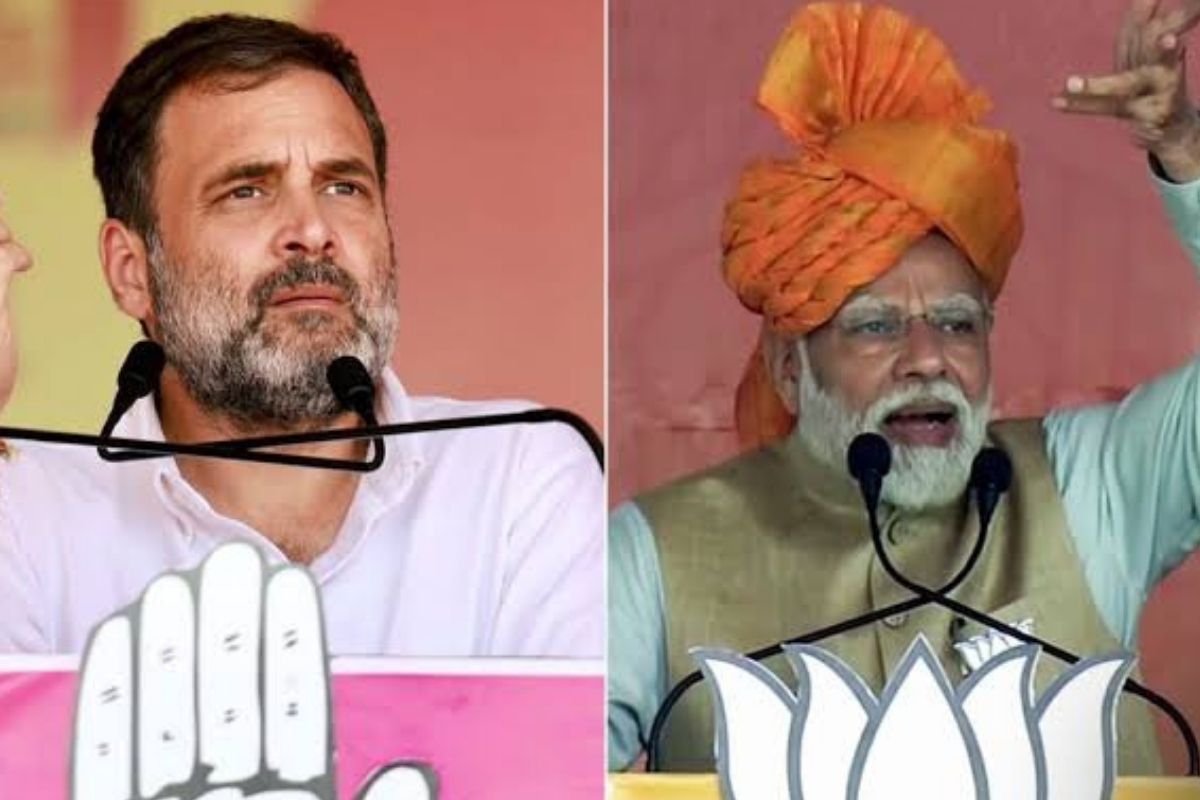The Bharatiya Janata Party (BJP) on Sunday released its poll manifesto called ‘Sankalp Patra’ at party headquarters in New Delhi. The saffron party’s manifesto was unveiled by Prime Minister Narendra Modi.
This comes eight days after the principal opposition Congress announced its ‘Nyay Patra’ for the upcoming Lok Sabha elections.
Advertisement
While the main element in the BJP manifesto is ‘Modi ki Guarantee’, the Congress party’s ‘Nyay Patra’ is centred around “work” “wealth” and welfare”.
Now that the manifestos of the BJP and the Congress are out, we bring you the major poll planks of both the parties.
Below are the key promises of BJP and Congress:
BJP on jobs: The saffron party has promised to make Bharat a global manufacturing hub and enhance employment in this crucial sector.
The BJP said that unprecedented investment in infrastructure has created a large number of employment opportunities.
“We will continue this investment for employment growth,” the BJP ‘Sankalp Patra’ promised.
Besides, the BJP has also promised to create employment opportunities in tourism and several other sectors.
It also said that government vacancies will be filled “in a time bound and transparent manner.”
Congress on jobs: The Congress party has promised “a new Right to Apprenticeship Act to provide a one year apprenticeship with a private or a public sector company to every diploma holder or college graduate below the age of 25. Apprentices will get 1 lakh a year.”
It will also provide “fast-track courts to adjudicate cases of leaking question papers for job examinations and provide monetary compensation to the victims.”
The grand old party has also promised to fill the nearly 30 lakh vacancies in sanctioned posts at various levels in the central government.
Congress will restructure the Fund of Funds Scheme for start-ups and allocate 50 per cent of the available fund, as far as possible equally among all districts, for providing funds to youth below 40 years of age to start their own businesses and generate employment.
BJP on women: In its manifesto, the saffron party said that it will empower three crore rural women to become Lakhpati Didis.
“We will empower women Self-Help Groups (SHGs) with the skills and tools in key service sectors like IT, healthcare, education, retail and tourism with an aim to increase their income and integrate women Self-Help Groups (SHGs) with ongoing initiatives such as One District One Product (ODOP), Farmer Producer Organizations (FPOs), Ekta Mall, ONDC, GEM, One Station One Product, enhancing better market access for their products.
The BJP has also promised to ensure development of infrastructure such as working women’s hostels, creches etc. with the specific focus on locations near industrial and commercial centres to facilitate increased participation of women in the workforce.
Strengthening 112 women helpline and ensuring participation of women in Parliament and state assemblies are also among the BJP’s key announcements on women welfare.
Congress on women: The Opposition Congress has resolved to launch a Mahalakshmi scheme to provide 1 lakh per year to every poor Indian family as an unconditional cash transfer.
The Congress has also promised 50 per cent reservation for women in Central government jobs. It has also promised to double the salaries of Asha, Anganwadi and mid-day meal cooks.
The grand old party has also promised to implement “same work, same wages” in order to prevent discrimination in wages for women.
BJP on health: BJP “will strengthen our network of AIIMS to provide quality healthcare across the country.” The saffron party has also promised to increase the number of UG and PG seats in medical education.
PM-Ayushman Bharat Health Infrastructure Mission) further expand for robust health care.
Congress on health: In its poll manifesto, the Congress promised that healthcare will be universal and free in public health centres such as hospitals, clinics, primary health centres, mobile healthcare units, dispensaries and health camps.
The Rajasthan Model of cashless insurance up to 25 lakhs will be adopted for universal healthcare.
Primary Health Centres (PHC) will be upgraded according to Indian Public Health Standards norms, and diagnostics will be added in each PHC.
BJP on farmers:
Strengthening PM KISAN
”We are providing annual financial assistance of ₹6,000 under PM Kisan Samman Nidhi Yojana. We are committed to sustained financial support for our farmers.”
Strengthening PM Fasal Bima Yojana
”We will further strengthen the PM Fasal Bima Yojana through more technological interventions to ensure speedy and more accurate assessment, faster payouts and quicker grievance resolution.”
Increase in MSP: ”We have ensured an unprecedented increase in MSP for major crops, and we will continue to increase MSP from time to time”.
Congress on farmers: The party has promised to give a legal guarantee to the Minimum Support Prices (MSP) announced by the government every year, as recommended by the Swaminathan Commission.
The Commission for Agricultural Costs and Prices (CACP) will be made a statutory body.
MSP payable to the farmer-seller at the procurement centres and APMCs will be directly credited digitally to the bank account of the farmer.
BJP on education:
In its manifesto, the BJP said, “7 IITs, 16 IIITs, 7 IIMs, 15 AIIMS, 315 Medical Colleges and 390 universities have been set-up in the past decade. We are committed to strengthening these institutes and further increasing the number of institutions of higher learning. We will continue to upgrade the existing institutions through focused funding, capacity building, infrastructure upgradation and dedicated research grants.
It has also promised to implement the ‘One Nation, One Student ID’ through the Automated Permanent Academic Account Registry (APAAR) to store academic qualifications, credit scores and certificates, among others for students from pre-primary to higher education.
Congress on education: The party has promised to amend the RTE Act to make education from Class I to Class XII in public schools compulsory and free. It has also announced plans to revisit and amend the New Education Policy.
“For greater equity, affordability and transparency in school fees charged by private schools, we will encourage state governments to establish fee regulation committees,” the Congress announced.











